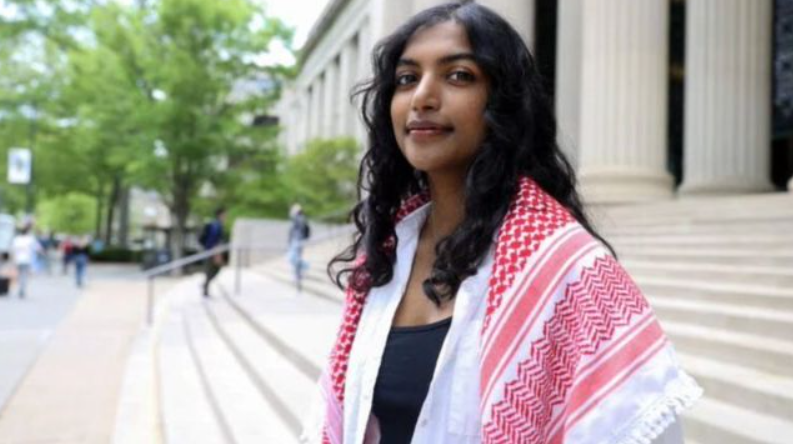
Indian-American student Megha Vemuri of the Massachusetts Institute of Technology (MIT), was banned from attending a graduation ceremony on Friday after she delivered a pro-Palestinian speech during a commencement event on May 29. Vemuri was designated to be the marshal at the graduation ceremony, however, the university announced that she and her family were barred from attending the event.
Vemuri, the elected class president and a double major in computation and cognition and linguistics, spoke at MIT’s OneMIT Commencement Ceremony in Cambridge. Her speech, which was not pre-approved, denounced MIT’s research ties with Israel and accused the university of being complicit in the “genocide” of the Palestinian people.
Following the speech, University Chancellor Melissa Nobles informed Vemuri that she would not be allowed to participate in the graduate ceremony on Friday, adding that she would receive her diploma by mail. In a statement, the university said: “MIT supports free expression but stands by its decision, which was in response to the individual deliberately and repeatedly misleading Commencement organizers and leading a protest from the stage.”
In response to MIT’s decision to bar her from the graduation ceremony, Vemuri said she was not disappointed about missing the event. “I see no need for me to walk across the stage of an institution that is complicit in this genocide,” she wrote. However, she expressed disappointment with the university’s handling of the situation, saying school officials “massively overstepped their roles to punish me without merit or due process.”
According to data from the United States Department of Education, MIT received $2.8 million in grants, gifts, and contracts from Israeli entities between 2020 and 2024, as reported by The Boston Globe and cited by The New York Times.
Who is Megha Vemuri?
Born and raised in Alpharetta, Georgia, Vemuri graduated from Alpharetta High School in 2021. She studied computer science, cognition, and linguistics at MIT, recently completing her degree while serving as the class president.
At MIT, Vemuri was also a part of the Written Revolution, a student group that “platforms revolutionary thought on campus” through writing and art, which it describes as “powerful tools for conducting a revolution.”
Before enrolling at MIT, she interned at the Neuroscience Institute at the University of Cape Town in South Africa and participated in various youth leadership and science outreach programs.
Vemuri’s ONEMIT speech quickly went viral on social media, drawing widespread criticism. In response to the online backlash, she has since taken down her LinkedIn profile.
Taking the stage wearing a red keffiyeh – a symbol of solidarity with Palestine – Vemuri was one of nine speakers at MIT’s OneMIT Commencement Ceremony on Thursday. Read from crumpled sheets of paper, her speech, roughly four minutes long, was addressed to her classmates, highlighting some of their efforts to protest against Israel.
“You showed the world that MIT wants a free Palestine,” she said, adding, “The MIT community that I know would never tolerate a genocide.”
After Vemuri left the stage to a round of applause, MIT President Sally Kornbluth spoke next. She paused as some people began chanting, and then responded, “OK, listen folks. At MIT, we believe in freedom of expression. But today is about the graduates.”
President Kornbluth has found herself on this type of tightrope before. In December 2023, she testified before the US House Committee on Education and the Workforce, alongside student presidents of Harvard and the University of Pennsylvania. The hearing was on how universities were handling campus protests and allegations of antisemitism. Unlike her counterparts Claudine Gay and Liz Magill —both of whom were replaced by their schools — Kornbluth managed to avoid serious consequences.









